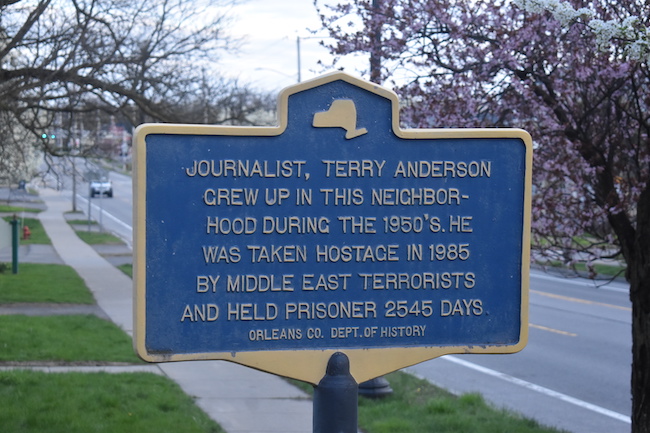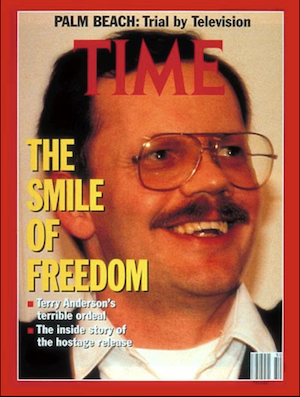Terry Anderson, Albion native held hostage, dies at 76
Anderson was captive for 2,545 days before his release on Dec. 4, 1991

Photo by Tom Rivers: This historical marker in Albion is on main Street by the Pullman Memorial Universalist Church and notes Terry Anderson, a journalist from Albion, was held hostage for almost seven years.
Terry Anderson, one of the most famous people from Albion, died today at age 76.
Anderson spent several years of his childhood in Albion before moving to Batavia and graduating from high school there in 1965.

Terry Anderson is on the cover of Time magazine on Dec. 16, 1991 after being released after nearly seven years as a hostage. Part of his glasses are missing.
He worked as a newspaper reporter for the Associated Press and was the AP’s bureau chief in Lebanon when he was taken hostage by Islamic militants on March 16, 1985. His sister Peggy Say fought for his freedom, meeting with the Pope, Mother Teresa and President Ronald Reagan. Say died in 2015.
Many prayer vigils were held in Western New York, and his status as one of the longest-held American hostages was frequently in the news in Western New York and nationally. He finally gained his release on Dec. 4, 1991, and met his daughter Sulome for the first time. She was 6 ½ when she finally could hug her father in person.
Anderson chronicled the ordeal of being kept captive in a book, “Den of Lions.” Anderson died at his home in Greenwood Lake in Orange County, NY, his daughter Sulome Anderson told the AP.
Anderson made an appearance in Albion in the late 1990s in the fundraiser for Community Action, a rare local event for him.
“Though my father’s life was marked by extreme suffering during his time as a hostage in captivity, he found a quiet, comfortable peace in recent years. I know he would choose to be remembered not by his very worst experience, but through his humanitarian work with the Vietnam Children’s Fund, the Committee to Protect Journalists, homeless veterans and many other incredible causes,” Sulome Anderson said in a statement.
After his release and return to the United States, Anderson taught journalism at prominent universities, ran for Congress, operated a blues bar, Cajun restaurant, horse ranch and gourmet restaurant, the AP reported today.
The Orleans County Department of History erected a historical marker for Anderson on Main Street in Albion near the Pullman Memorial Universalist Church. The marker notes Anderson grew up in this neighborhood in the 1950s, and would later be taken hostage and held prisoner for 2,545 days.
Frances Pierce posted this comment on the Orleans Hub Facebook page: “Terry was actually born in Ohio. His family moved to Albion when Terry was still a child. His family lived in the upstairs of the big house that sits on the corner of Clarendon and East State Street, directly across from what was then Guido’s. Terry was a lot of fun and super smart. We hung around in the same group including Lynn Miller, Terry’s then best friend. His family moved to Batavia a year or so before graduation from High School. He was one of a kind, one that you never forget.”
Dorothy Boyer of Albion sent in this childhood memory of Terry Anderson: “When I knew Terry Anderson in the ’50s he lived where Bloom’s Flower Shop used to be on Main Street. As far as I know they had the whole house. We used to go over on a Friday night when his mom got home from Marti’s (Supper Club) and help her count all of her tips. It was so much fun as a child to do. We used to play canasta together and yes, he was Lynn Miller’s best friend. We had a bamboo fort behind his house with a lot of patches. It was always fun.”
The Committee to Protect Journalists is an independent, nonprofit organization that promotes press freedom worldwide. CPJ defends the right of journalists to report the news safely and without fear of reprisal.
CPJ issued this statement:
“The Committee to Protect Journalists is deeply saddened by the death of Terry Anderson, journalist and CPJ’s former vice chair and honorary chairman.”
Anderson, a former Associated Press journalist who was kidnapped and held hostage in Lebanon for six years, knew firsthand the threats that faced journalists seeking to report freely, and was an outspoken and dedicated advocate for press freedom.
“Terry was part of the CPJ family for over 25 years,” said Jacob Weisberg, CPJ chair. “He took that responsibility seriously – joining CPJ to advocate on behalf of journalists at risk around the world at the highest levels. Our thoughts are with his family and especially with his daughter Sulome, herself a journalist.”
In 1998, Anderson was part of a CPJ delegation that met with then Turkish Prime Minister Mesut Yilmaz to press for an end to the jailing of journalists in the country. A year later, he and CPJ colleagues traveled to Yemen to ask Prime Minister Abdel Karim al-Iryani to halt the arrests and harassment of editors and reporters there.
“Terry Anderson’s public advocacy was instrumental in freeing journalists from jail and protecting them against the worst abuses,” said former CPJ Executive Director Joel Simon, who worked closely with Anderson during the years that Simon led CPJ. “But what distinguished Terry was his personal and often private interventions on behalf of journalists held hostage around the world. Terry counseled many families experiencing helplessness and trauma. His deep compassion helped them understand they were not alone and bolstered their spirits in the darkest times.”
Anderson accepted an Emmy in 2006 on behalf of CPJ for its work in defense of press freedom. His words then resonate more than ever today, with record numbers of journalists in jail, near record levels of killings and threats against journalists in all corners of the globe:
“CPJ began its work…and continues it today, not because we believe journalists deserve more protection than anyone else, but because we believe that journalists are the first to be attacked by those who wish to oppress, to deny the basic human rights and human dignity of all,” he said. “Journalists are on the front line, the first casualties in the constant fight to preserve freedom.”




































































